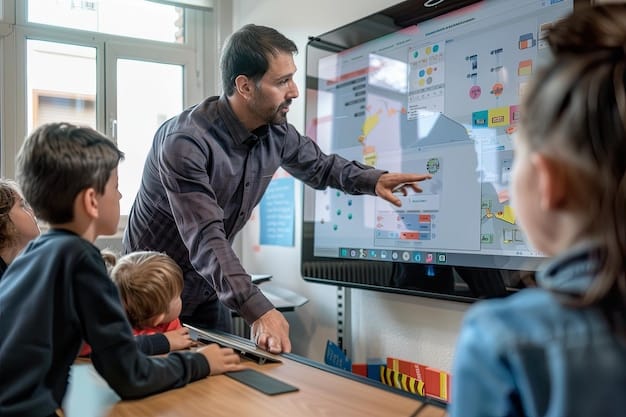AI in Education: Adapting Schools and Your Child’s Future

The Impact of AI on Education is transforming schools through personalized learning, AI-driven tools for teachers, and new educational approaches, promising to reshape your child’s future academic experience and career readiness.
The rise of artificial intelligence is no longer a futuristic concept; it’s actively reshaping various sectors, and education is no exception. The impact of AI on education is becoming increasingly evident as schools adapt to integrate these technologies, raising important questions about what this means for your child’s future.
The Growing Presence of AI in Education
AI is rapidly moving from a theoretical possibility to a practical tool in classrooms. This section explores how AI is currently being implemented and its potential for further growth.
Current AI Applications in Schools
From personalized learning platforms to automated grading systems, AI is already making inroads. These applications aim to enhance both the teaching and learning experiences.
- AI-powered tutoring systems providing customized support
- Automated grading of assignments, saving teachers time
- Tools that analyze student data to identify learning gaps
AI is also helping to create more accessible learning environments for students with disabilities. For example, AI-driven translation tools can assist non-English speakers, while speech-to-text software can support students with writing difficulties.

Potential for Future Expansion
Looking ahead, AI could revolutionize education even further. Imagine AI assistants that can answer student questions in real-time or create personalized lesson plans tailored to individual learning styles.
Furthermore, AI could play a crucial role in lifelong learning, providing continuous support and resources as students transition into the workforce. This includes providing personalized career guidance and skill development recommendations.
In conclusion, AI’s growing presence in education offers exciting possibilities for improving learning outcomes, personalizing instruction, and preparing students for the challenges of the future.
Personalized Learning: AI’s Unique Contribution
One of the most significant benefits of AI in education is its capacity to personalize learning. By analyzing vast amounts of student data, AI can tailor educational content to meet individual needs.
Adapting to Individual Learning Styles
Traditional classrooms often struggle to accommodate diverse learning styles. AI addresses this by providing customized learning paths and content formats.
- AI algorithms that adjust the difficulty level based on student performance
- Personalized feedback and support for individual learning needs
- Adaptive learning platforms that cater to visual, auditory, and kinesthetic learners
This level of personalization ensures that each student can learn at their own pace and in a way that resonates with their unique learning preferences.
Benefits of Personalized Education
Personalized learning can lead to increased engagement, improved learning outcomes, and greater student satisfaction. It can also help to close achievement gaps and ensure that all students have the opportunity to succeed.

By providing tailored support and resources, personalized education empowers students to take ownership of their learning journey, fostering a sense of autonomy and motivation.
In summary, AI’s contribution to personalized learning has the potential to transform education by creating more engaging, effective, and equitable learning experiences for all students.
AI-Powered Tools for Teachers: Enhancing Instruction
While AI can personalize learning for students, it also offers a range of tools to support and enhance the work of teachers. Think of AI as a collaborative partner that helps educators be more efficient and effective.
Automated Administrative Tasks
Teachers often spend a significant portion of their time on administrative tasks. AI can automate many of these tasks, freeing up teachers to focus on instruction and student support.
From grading assignments and creating quizzes to managing student records, AI-powered tools can streamline administrative processes and reduce the burden on teachers.
Data-Driven Insights for Instruction
AI can provide teachers with valuable insights into student performance and learning patterns. This data can inform instructional decisions and help teachers tailor their approach to meet the needs of their students.
AI can analyze student work, identify areas of struggle, and recommend specific interventions or resources. This allows teachers to provide targeted support and ensure that all students are progressing effectively.
AI-powered tools for teachers have the potential to transform teaching by automating administrative tasks, providing data-driven insights, and personalizing instruction. This empowers teachers to be more effective and responsive to the needs of their students.
Addressing the Challenges of AI in Education
While AI offers many benefits for education, it also presents several challenges that must be addressed. These challenges range from ensuring equitable access to addressing ethical concerns.
Equitable Access to Technology
One of the biggest challenges is ensuring that all students have equal access to AI-powered tools and resources. This includes addressing the digital divide and providing adequate training and support for teachers and students.
Data Privacy and Security
AI relies on data, raising concerns about privacy and security. Schools must implement robust data protection measures and ensure that student data is used ethically and responsibly.
- Implementing strict data governance policies
- Providing transparency about how data is collected and used
- Training teachers and students on data privacy best practices
Additionally, schools need to be transparent with parents and students about how AI is being used and what data is being collected.
Ethical Considerations
AI algorithms can perpetuate biases if not designed and implemented carefully. Schools must ensure that AI systems are fair, unbiased, and aligned with ethical principles.
Addressing the challenges of AI in education requires a proactive and collaborative approach. By ensuring equitable access, protecting data privacy, and addressing ethical considerations, we can harness the power of AI to improve education for all students.
Preparing Students for an AI-Driven World
As AI becomes increasingly prevalent in the workplace, it’s essential to prepare students for an AI-driven world. This includes equipping them with the skills and knowledge they need to thrive in a rapidly changing landscape.
Developing Essential Skills
In addition to traditional academic skills, students need to develop skills such as critical thinking, problem-solving, creativity, and collaboration. These skills will be essential for navigating the complexities of an AI-driven world.
Encouraging Digital Literacy
Students need to be digitally literate, meaning they can effectively use technology to access, evaluate, and create information. This includes understanding how AI works and its potential impact on society.
Furthermore, schools must provide opportunities for students to develop coding and programming skills, as these skills will be increasingly valuable in an AI-driven world.
Adapting Curriculum
Schools must adapt their curriculum to reflect the changing demands of the workforce. This includes integrating AI-related topics into existing courses and creating new courses that focus on AI and its applications.
Preparing students for an AI-driven world requires a holistic approach that focuses on developing essential skills, encouraging digital literacy, and adapting the curriculum. By equipping students with these tools, we can ensure that they are prepared to thrive in the future.
AI and the Future of Higher Education
The impact of AI is not limited to primary and secondary education, it will also be transformative in higher education, reshaping everything from admissions processes to research methodologies.
AI in College Admissions
AI is being used to streamline the college admissions process. It can efficiently analyze applications, predict student success, and identify promising candidates. However, this raises concerns about fairness and transparency.
- Algorithms that assess applicant qualifications
- AI-driven chatbots that answer prospective student questions
- Tools that personalize campus tours and recruitment efforts
AI-Assisted Research
AI is also revolutionizing research in higher education. It can analyze vast amounts of data, identify patterns, and accelerate the pace of discovery.
By automating repetitive tasks and providing insights that would otherwise be impossible to obtain, AI is enabling researchers to tackle complex problems and make groundbreaking discoveries.
Personalized Learning in Colleges
AI can also personalize learning in higher education, adapting to individual learning styles and providing customized support.
AI’s role in higher education will continue to grow as institutions seek to leverage its power to improve outcomes, enhance research, and prepare students for the challenges of the future.
| Key Point | Brief Description |
|---|---|
| 🤖 Personalized Learning | AI tailors education to each student’s needs. |
| 👩🏫 AI Tools for Teachers | AI assists with grading and insights. |
| 🌍 Equitable Access | Ensuring all students benefit from AI. |
| 🎓 Future Skills | Preparing students for an AI-driven world. |
Frequently Asked Questions
▼
AI is currently utilized in education through personalized learning platforms, automated grading systems, and AI-powered tutoring tools. It also helps in identifying learning gaps and creating accessible environments for students with disabilities.
▼
Personalized learning with AI can increase student engagement, improve learning outcomes, and boost student satisfaction. It adapts to individual learning styles and can close achievement gaps, ensuring equitable opportunities for all.
▼
AI tools can free up teachers’ time by automating administrative tasks, providing data-driven insights into student performance, and personalizing instruction. This allows teachers to focus more on student support and tailored instruction.
▼
Ethical concerns include ensuring equitable access to technology, protecting data privacy and security, and preventing AI algorithms from perpetuating biases. Schools must address these concerns to ensure fair and ethical use.
▼
Prepare students by developing essential skills like critical thinking and problem-solving, encouraging digital literacy, and adapting the curriculum to integrate AI-related topics. This ensures students thrive in a changing landscape.
Conclusion
The impact of AI on education is far-reaching, offering personalized learning experiences and innovative tools for both students and teachers. By addressing the challenges and embracing the opportunities, we can ensure that AI transforms education for the better, preparing all students for a successful future.





